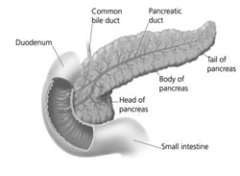Pancreatic Conditions
Find your care
Our skilled specialists lead the nation in advanced diagnostics and treatments for pancreatic disease and pancreatic cancer. Call 310-206-6889 to connect with us.
UCLA is a leading research center that offers advanced pancreatic disease treatments only available at a handful of hospitals nationwide. We know pancreatic disease can be both frightening and painful. Our integrated clinic helps you get treated as quickly as possible to help minimize any stress and anxiety.
Pancreatic Diseases We Treat
Our comprehensive team of specialists is experienced in treating all pancreatic disease types. Our center also treats diseases of the bile duct (carries digestive fluid from the liver and gallbladder), gallbladder and duodenum (the first part of the small intestine).
We provide advanced imaging and diagnosis for all pancreatic diseases, using minimally invasive techniques whenever possible. Conditions we treat include:
- Pancreatic cancer (Pancreatic adenocarcinoma): We offer clinical trial opportunities for all stages of pancreatic cancer, as well as a highly experienced surgical team. Our pancreatic cancer survival rates are among the best in the nation.
- Pancreatic Neuroendocrine tumors: Our doctors diagnose pancreatic neuroendocrine tumors with imaging tests and by analyzing biopsy samples in the lab.
- Pancreatic cysts: Our specialists are experts in the diagnosis and treatment of pancreatic cysts. Our minimally invasive diagnosis and treatment options often eliminate the need for surgery.
- Acute pancreatitis: Our center provides minimally invasive diagnosis methods to find out if patients need surgery for acute pancreatitis.
- Chronic pancreatitis: Chronic pancreatitis is a special area of interest for our surgeons and specialists. We are the only hospital in the Southwest that offers auto-islet transplant for chronic pancreatitis.
- Bile duct cancer (cholangiocarcinoma) and bile duct cysts: UCLA’s interventional endoscopy team offers minimally invasive diagnosis and treatment for bile duct diseases. We are often able to provide diagnosis and symptom relief during a single visit. We also treat patients with bile duct injuries. Read more about periampullary and bile duct diseases.
What Is the Pancreas?

Illustration: the pancreas, common bile duct, and small intestine.
The pancreas is a gland that makes digestive enzymes (juices) and hormones like insulin that control blood sugar. The enzymes are secreted into the intestine to help digest food. The hormones help the body use or store the energy that comes from food.
The pancreas is roughly 6 inches long, nestled deep in the abdomen between the stomach and the spine. It has three sections: the head, the body and the tail. The head of the pancreas connects to the duodenum on the right side of the abdomen, with the body extending left and tapering towards the tail.
How the Pancreas Works
The pancreas is composed of two main cell types: exocrine and endocrine cells. Exocrine cells make compounds that help break down food (enzymes), while endocrine cells make hormones like insulin to control blood sugar.
Exocrine cells secrete enzymes into small tubes, or ducts, which combine into larger tubes that empty into the main pancreatic duct. The pancreatic duct joins the bile duct, which carries bile (digestive juices) from the liver and empties into the duodenum (the first part of the small intestine). The stomach delivers partially digested food to the duodenum as well.
Endocrine cells represent a smaller portion of pancreatic cells, clustered into groups called islets that produce hormones like insulin and glucagon. These hormones control blood sugar and are secreted directly into the bloodstream.
Pancreatic disease interferes with the normal digestive process and can cause problems such as:
- Painful blockages in the bile duct that allow bile to get backed up, leading to jaundice (yellowing of the skin and eyes)
- Inability to produce digestive enzymes (exocrine insufficiency), making it difficult to digest food
- Inability to produce hormones that control blood sugar (endocrine insufficiency), which can cause diabetes